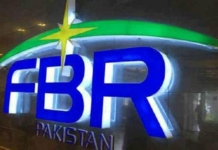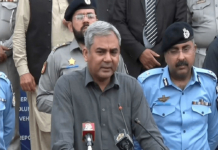The chief executives and representatives of all provinces on Wednesday agreed to a proposal to shut down markets at 8:30pm in an effort to conserve energy.
The issue came under discussion during a meeting of the freshly reconstituted National Economic Council (NEC), which was chaired by Prime Minister Shehbaz Sharif and attended among others by chief ministers of Sindh, Punjab and Balochistan. Khyber Pakhtunkhwa Chief Minister Mahmood Khan did not attend the meeting, so Chief Secretary Shehzad Bangash represented the province instead.
According to a handout issued after the meeting, the chief ministers of Sindh, Balochistan and Punjab sought two days to consult trade bodies and business communities in their respective provinces regarding the proposal.
During the meeting, the chief ministers were consulted on the national strategy for tackling the energy crisis. The participants were also informed about the federal cabinet’s decisions and proposals for conserving energy, the statement said.
On the other hand, KP Finance Minister Taimur Khan Jhagra said in a tweet that the province had not agreed to close down markets. “KP has not agreed to this. It was put forward that KP will decide after consultation with the CM,” he said.
The decision comes amidst an acute energy shortfall, with parts of the country witnessing hours-long load shedding.
The austerity measures are being taken to minimise the use of electricity, as its current demand is 28,400 megawatts, while the shortfall has hit 4600MW amidst an extraordinary heatwave.
A day earlier, the federal cabinet decided that priority would be given to holding government meetings virtually until an energy conservation plan was approved. The cabinet also decided to cut the consumption of utilities at the government level and in offices by 10 per cent.
On the other hand, Islamabad Deputy Commissioner Irfan Nawaz Memon announced the imposition of Section 144 of the Criminal Procedure Code (CrPC) to ban wedding ceremonies in the federal capital after 10 pm and ensure a one-dish menu at marriage functions.
The decision to this effect was made in line with the instructions of the government, which were issued to save energy and curb inflation, the DC told the owners of wedding halls and marquees in a meeting. He said the law would be applicable to all places wherever wedding ceremonies were held, including restaurants, farmhouses and homes.
Meanwhile, the federal government, through a notification, confirmed restoring Saturday as a weekly holiday with immediate effect.
As per the new schedule, federal government offices will operate from 8 am to 4 pm from Monday to Thursday with a prayer break from 1 pm to 1:30 pm. On Friday, the offices will observe the same timings with a prayer break from 12:30 pm to 2:30 pm.
Taxes abolished:
Also, Prime Minister Shehbaz Sharif – as part of his government’s vision to develop an export-oriented economy – directed the authorities concerned to abolish all taxes on the raw materials of the export industry.
The premier, in a meeting with a delegation of the American Business Council, also directed the formation of task forces to attract investment in multiple sectors.
The task forces would be formed in the fields of tourism, pharmaceuticals, information technology, e-commerce, large-scale manufacturing and agriculture.
He told the delegation that the government was making efforts to ensure the production of export quality agricultural products.
Representatives of pharmaceuticals, food processing, IT, e-commerce, retail, textile, sports, and logistics sectors were part of the delegation.
On the other hand, the NEC approved the annual targets for the upcoming fiscal year 2022-23, including the economic growth target set at 5 per cent, along with efforts to raise it to 6 per cent.
The NEC, presided over by Shehbaz Sharif, also approved various sectors’ growth targets for the new fiscal year, including agriculture at 3.9%, industries at 5.9% and services at 5.1 %.
The council also approved the Macro-Economic Framework for Annual Plan 2022-23. The proposed allocation of Rs800 billion for the Public Sector Development Plan (PSDP) for the next fiscal was also approved by the council.







